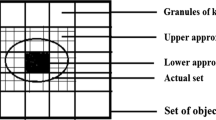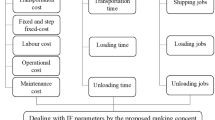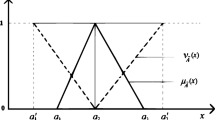Abstract
This research mainly focuses on presenting an innovative study of a multi-stage multi-objective fixed-charge solid transportation problem (MMFSTP) with a green supply chain network system under an intuitionistic fuzzy environment. The most controversial issue in recent years is that greenhouse gas emissions such as carbon dioxide, methane, etc. induce air pollution and global warming, thus motivating us to formulate the proposed research. In real-world situations the parameters of MMFSTP via a green supply chain network system usually have unknown quantities, and thus we assume trapezoidal intuitionistic fuzzy numbers to accommodate them and then employ the expected value operator to convert intuitionistic fuzzy MMFSTP into deterministic MMFSTP. Next, the methodologies are constructed to solve the deterministic MMFSTP by weighted Tchebycheff metrics programming and min-max goal programming, which provide Pareto-optimal solutions. A comparison is then drawn between the Pareto-optimal solutions that are extracted from the programming, and thereafter a procedure is performed to analyze the sensitivity analysis of the target values in the min–max goal programming. Finally, we incorporate an application example connected with a real-life industrial problem to display the feasibility and potentiality of the proposed model. Conclusions about the findings and future study directions are also offered.


Similar content being viewed by others
References
Aggarwal S, Gupta C (2016) Solving intuitionistic fuzzy solid transportation problem via new ranking method based on signed distance. Int J Uncertainty Fuzziness Knowl Based Syst 24:483–501
Angelov PP (1997) Optimization in an intuitionistic fuzzy environments. Fuzzy Sets Syst 86:299–306
Atanassov KT (1986) Intuitionistic fuzzy sets. Fuzzy Sets Syst 20:87–96
Charnes A, Cooper W (1961) Management models and industrial applications of linear programming, 1. Wiley, New York
Chen L, Peng J, Zhang B (2017) Uncertain goal programming models for bicriteria solid transportation problem. Appl Soft Comput 51:49–59
Dalman H (2018) Uncertain programming model for multi-item solid transportation problem. Int J Mach Learn Cybernet 9(4):559–567
Ebrahimnejad A (2016) New method for solving fuzzy transportation problems with LR flat fuzzy numbers. Inf Sci 357:108–124
Ebrahimnejad A, Verdegay JL (2018) A new approach for solving fully intuitionistic fuzzy transportation problems. Fuzzy Optim Decis Making 17(4):447–474
Geoffrion AM, Graves GW (1974) Multicommodity distribution system design by benders decomposition. Manage Sci 20(8):22–44
Grzegrorzewski P (2003) The hamming distance between two intuitionistic fuzzy sets. In: Proceedings of the 10th IFSA World Congress, Istanbul, Turkey, pp 35–38
Gupta G, Kaur J, Kumar A (2016) A note on fully fuzzy fixed charge multi-item solid transportation problem. Appl Soft Comput 41:418–419
Haley KB (1962) The solid transportation problen. Oper Res 10:448–463
Hassanzadeha F, Nematia H, Sunb M (2013) Robust optimization for multi-objective programming problems with imprecise information. Procedia Comput Sci 17:357–364
Hirsch WM, Dantzig GB (1968) The fixed charge problem. Naval Res Logist Q 15:413–424
Jones D, Tamiz M (2010) Practical goal programming. Springer, New York
Li L, Lai KK (2000) A fuzzy approach to the multi-objective transportation problem. Comput Oper Res 27:43–57
Maity G, Mardanya D, Roy SK, Weber GW (2019) A new approach for solving dual-hesitant fuzzy transportation problem with restrictions. Sadhana 44(4):75
Maity G, Roy SK, Verdegay JL (2020) Analyzing multimodal transportation problem and its application to artificial intelligence. Neural Comput Appl 32(7):2243–2256
Maity G, Roy SK, Verdegay JL (2019) Time variant multi-objective interval-valued transportation problem in sustainable development. Sustainability 11(21):6161
Maity G, Roy SK, Verdegay JL (2016) Multi-objective transportation problem with cost reliability under uncertain environment. Int J Comput Intell Syst 9(5):839–849
Midya S, Roy SK (2014) Solving single-sink fixed-charge multi-objective multi-index stochastic transportation problem. Am J Math Manag Sci 33(4):300–314
Midya S, Roy SK (2017) Analysis of interval programming in different environments and its application to fixed-charge transportation problem. Discrete Math Algorithm Appl 9(3):1750040 ((17 pages)
Midya S, Roy SK (2020) Multi-objective fixed-charge transportation problem using rough programming. Int J Oper Res 37(3):377–395
Mollanoori H, Moghaddam RT, Triki C, Keshteli MH, Sabouhi F (2019) Extending the solid step fixed-charge transportation problem to consider two-stage networks and multi-item shipments. Comput Ind Eng 137:106008
Nehi HM, Maleki HR (2005) Intuitionistic fuzzy numbers and it’s applications in fuzzy optimization problem, In Proceedings of the \(9^{th}\) WSEAS international conference on systems, Athens, Greece, 1-5
Paksoy T, Pehlivan NY, Özceylan E (2012) Fuzzy multi-objective optimization of a green supply chain network with risk management that includes environmental hazards. Hum Ecol Risk Assess 18:1120–1151
Raj KAAD, Rajendram C (2012) A genetic algorithm for solving the fixed-charge transportation model: two-stage problem. Comput Oper Res 39:2016–2032
Rani D, Gulati TR, Garg Harish (2016) Multi-objective non-linear programming problem in intuitionistic fuzzy environment: optimistic and pessimistic view point. Expert Syst Appl 64:228–238
Roy SK, Maity G, Weber GW (2017) Multi-objective two-stage grey transportation problem using utility function with goals. CEJOR 25:417–439
Roy SK, Maity G, Weber GW, Gök SZA (2017) Conic scalarization approach to solve multi-choice multi-objective transportation problem with interval Goal. Ann Oper Res 253(1):599–620
Roy SK, Ebrahimnejad A, Verdegay JL, Das S (2018) New approach for solving intuitionistic fuzzy multi-objective transportation problem. Sadhana 43(1):3
Roy SK, Midya S, Yu VF (2018) Multi-objective fixed-charge transportation problem with random rough variables. Int J Uncertainty Fuzziness Knowl Based Syst 26(6):971–996
Roy SK, Midya S (2019) Multi-objective fixed-charge solid transportation problem with product blending under intuitionistic fuzzy environment. Appl Intell 49(10):3524–3538
Roy SK, Midya S, Weber GW (2019) Multi-objective multi-item fixed-charge solid transportation problem under twofold uncertainty. Neural Comput Appl 31(12):8593–8613
Sakawa M, Katagiri H, Matsui T (2012) Fuzzy random bilevel linear programming through expectation optimization using possibility and necessity. Int J Mach Learn Cybernet 3(3):183–192
Singh SK, Yadav SP (2016) A new approach for solving intuitionistic fuzzy transportation problem of type-2. Ann Oper Res 243:349–363
Steuer RE, Choo EU (1983) An interactive weighted Tchebycheff procedure for multiple objective programming. Math Program 26(3):326–344
Tzeng GH, Huang JJ (2013) Fuzzy multiple objective decision making. CRC, Boca Raton
Upmanyu M, Saxena RR (2016) On solving a multi-objective fixed charge problem with imprecise fractional objectives. Appl Soft Comput 40:64–69
Wang F, Lai X, Shi N (2011) A multi-objective optimization for green supply chain network design. Decis Support Syst 51:262–269
Ye J (2011) Expected value method for intuitionistic trapezoidal fuzzy multicriteria decision-making problems. Expert Syst Appl 38:11730–11734
Yu FV, Hu KJ, Chang AY (2015) An interactive approach for the multi-objective transportation problem with interval parameters. Int J Prod Res 53(4):1051–1064
Tsao YC, Linh VT, Lu JC, Yu FV (2018) A supply chain network with product remanufacturing and carbon emission considerations: a two-phase design. J Intell Manuf 29(3):693–705
Zavardehi SMA, Nezhad SS, Moghaddam RT, Yazdani M (2013) Solving a fuzzy fixed charge solid transportation problen by metaheuristics. Fuzzy Sets Syst 57:183–194
Zhang B, Peng J, Li S, Chen L (2016) Fixed charge solid transportation problem in uncertain environment and its algorithm. Comput Ind Eng 102:186–197
Zimmermann HJ (1987) Fuzzy sets, decision making and expert systems. Kluwer Academic, Boston
Zhao S, Liang C, Zhang J (2017) Some intuitionistic trapezoidal fuzzy aggregation operators based on Einstein operations and their application in multiple attribute group decision making. Int J Mach Learn Cybernet 8(2):547–569
Acknowledgements
The authors are thankful to the respected Editor-in-Chief Professor Xi-Zhao Wang, anonymous Associate Editor, and reviewers for their invaluable suggestions, which have improved the quality of the paper.
Author information
Authors and Affiliations
Corresponding author
Ethics declarations
Conflict of interest
The authors confirm no possible conflicts of interest.
Ethical approval
This article does not contain any studies with human participants or animals performed by any of the authors.
Additional information
Publisher's Note
Springer Nature remains neutral with regard to jurisdictional claims in published maps and institutional affiliations.
Rights and permissions
About this article
Cite this article
Midya, S., Roy, S.K. & Yu, V.F. Intuitionistic fuzzy multi-stage multi-objective fixed-charge solid transportation problem in a green supply chain. Int. J. Mach. Learn. & Cyber. 12, 699–717 (2021). https://doi.org/10.1007/s13042-020-01197-1
Received:
Accepted:
Published:
Issue Date:
DOI: https://doi.org/10.1007/s13042-020-01197-1




